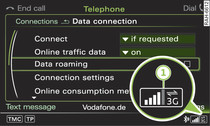
- Fig. 1 Menus and symbols

- Fig. 2 Configuring data connection
(A)
(B) Symbol / marking
(C) Explanation
(B) Symbol / marking
(C) Explanation
| (A) |
(B) |
(C) |
|---|---|---|
| -1- |
Heading |
Selected menu (e.g. Telephone) |
| -2- |
Selected option |
Selected function |
| -3- |
Arrow
up/down |
Further available functions |
| -4- |
TMC/TMCpro |
Reception of TMC/TMCpro traffic information
|
| -5- |
Import procedure* |
Indicates import/update of contacts in the directory/call lists |
| -6- |
Envelope* |
Unread text message Link
Crossed-out envelope: text message memory full Link |
| -7- |
Signal strength bars for mobile phone* |
Reception strength of mobile phone network of a connected mobile phone Link |
| -8- |
Signal strength bars for data connection* |
Reception strength of the active data connection Link, or
PIN: Entering SIM PIN PUK: Entering PUK SIM: Inserting SIM card |
| -9- |
Arrow |
Submenu with additional functions that can be called up by pressing the rotary pushbutton |
| -10- |
Mute |
Audio source muted
|
| -11- |
TP |
Reception of traffic announcements Link |
| -12- |
Copying procedure |
Copying audio/video files to the jukebox Link |
| -13- |
Telephone* |
Missed calls Link |
| -14- |
Bluetooth |
Bluetooth device connected |
| -15- |
2G/3G* |
Network coverage of the active data connection Link
2G: GSM network 3G: UMTS network When a data connection has been established, a symbol indicating the active data connection -1- Fig. 2 appears in the status line of the MMI display. |
| -16- |
Selection list |
Settings for the selected function that can be called up by pressing the rotary pushbutton. |
